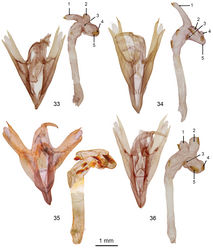Doryodes okaloosa
| Notice: | This page is derived from the original publication listed below, whose author(s) should always be credited. Further contributors may edit and improve the content of this page and, consequently, need to be credited as well (see page history). Any assessment of factual correctness requires a careful review of the original article as well as of subsequent contributions.
If you are uncertain whether your planned contribution is correct or not, we suggest that you use the associated discussion page instead of editing the page directly. This page should be cited as follows (rationale):
Citation formats to copy and paste
BibTeX: @article{Lafontaine2015ZooKeys, RIS/ Endnote: TY - JOUR Wikipedia/ Citizendium: <ref name="Lafontaine2015ZooKeys">{{Citation See also the citation download page at the journal. |
Ordo: Lepidoptera
Familia: Erebidae
Genus: Doryodes
Name
Doryodes okaloosa Sullivan & Lafontaine sp. n. – Wikispecies link – ZooBank link – Pensoft Profile
Type material
Holotype ♂, Florida, Okaloosa Co., Shalimar, black light trap, 3461, H. G. Hilton, genitalia slide FLMNH-MGCL 02951. FSCA.
Etymology
The species name is in honor of the Okaloosa, a tribe of the Creek Nation and longtime inhabitants of the area.
Diagnosis
This species probably occurs with Doryodes desoto and Doryodes reineckei in the salt marshes and tidal creeks throughout the coastal panhandle area of Florida. The species is slightly larger than Doryodes bistrialis, which may occur nearby but inland. The washed out appearance of Doryodes reineickei immediately distinguishes it from Doryodes okaloosa. Doryodes desoto is very similar and at present dissection of the male genitalia is the only reliable way to distinguish these two species, although based on the single specimen of Doryodes okaloosa, it appears that Doryodes okaloosa is broader winged than Doryodes desoto, but not as broad winged as Doryodes reineckei. The abundance of large cornuti in the vesica, as well as the spatulate lower process of the valve and the short, broad aedeagus distinguishes Doryodes okaloosa from all other Doryodes species.
Description
Forewing length 16.5 mm; forewing stripe dark brown, narrower than for Doryodes spadaria but wider than for Doryodes desoto; forewing wider and browner than in Doryodes spadaria and Doryodes desoto, but not as wide as in Doryodes reineckei, and longitudinal stripe sharply defined, unlike that of Doryodes reineckei. Antennae missing but presumed to be bipectinate as in other species in genus. Hind wing white with buff tinge. Male genitalia mainly as described for genus. Dorsal heavily-sclerotized margin of valve wider and less well defined than in other species except for tapered spine-like apex; apex not rounded as in Doryodes tenuistriga, but wider than in other species; ventral sclerotized margin of valve slightly tapered to a broadly spatulate apex, much as in Doryodes tenuistriga. Aedeagus cylindrical, about 5 × as long as mesial width. Vesica with swollen area distal to end of aedeagus about 0.5 × as long as aedeagus and about 2 × as long as wide, with four large spine-covered sclerotized plates; diverticulum 1 slightly longer than wide with large deeply-serrated cornutus near apex; three preapical diverticula, each with large shark-fin-like cornutus; arrangement of large cornuti not seen in any other species of Doryodes.
Distribution and biology
At present this species is known from the holotype collected in Okaloosa County, Florida. It likely ranges south in the coastal brackish marshes toward the St. Petersburg/Tampa area and to the west along the Florida coast but little collecting has been done in salt marshes of the Florida Panhandle.
Original Description
- Lafontaine, J; Sullivan, J; 2015: A revision of the genus Doryodes Guenée, 1857, with descriptions of six new species (Lepidoptera, Erebidae, Catocalinae, Euclidiini) ZooKeys, (527): 3-30. doi
Images
|

